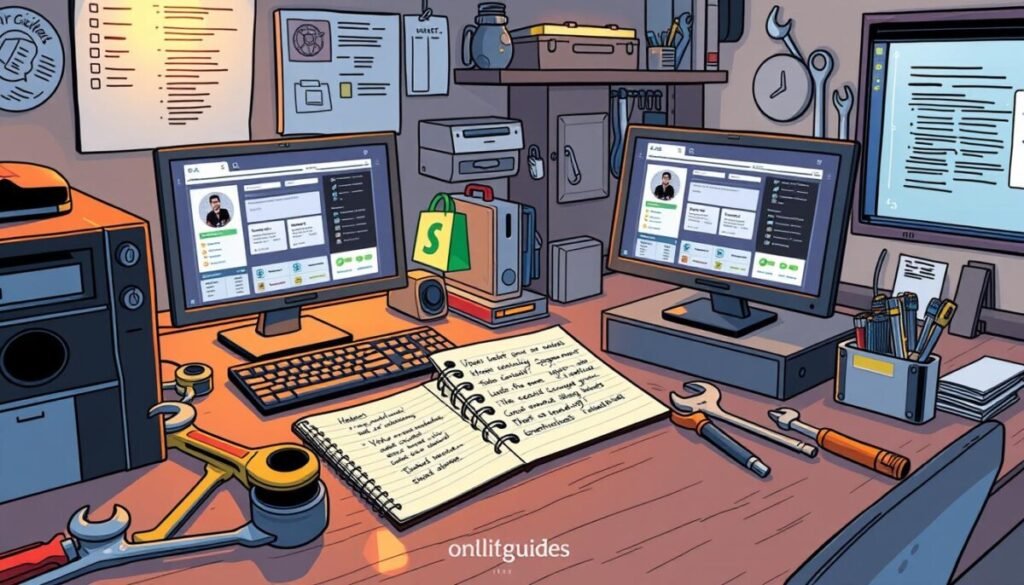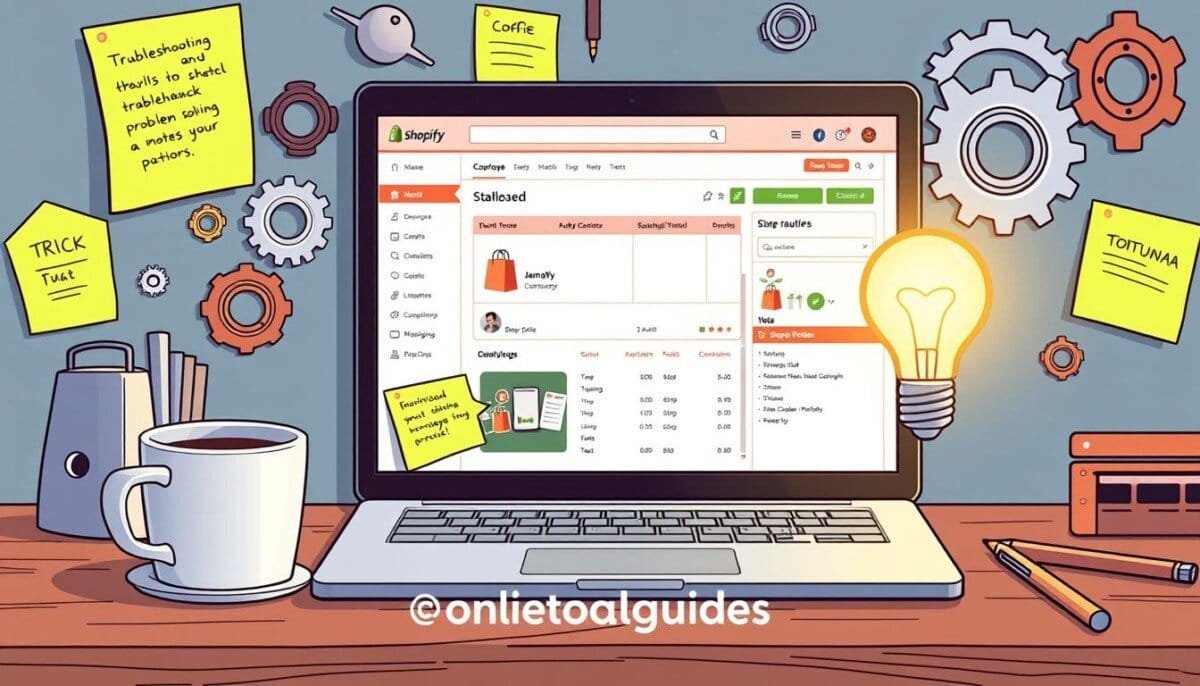Did you know 84% of users struggle with mobile transactions on Shopify? This shows a big problem for many store owners. They need to make their Shopify stores work better.
Common issues include slow loading, payment errors, and design problems. Fixing these helps customers and increases sales. This part will help store owners solve these problems. It will make their stores run smoothly and get better support.
Key Takeaways
- Identify common Shopify online store problems to enhance performance.
- Understand the importance of fast loading times for customer retention.
- Utilize technical support effectively to resolve recurring issues.
- Pay attention to payment gateway setup to ensure smooth transactions.
- Regularly review design elements to prevent glitches and improve user experience.
Common Shopify Store Problems
Shopify store owners face many challenges that can slow down their site. It’s key to tackle these Common Shopify Store Problems to keep things running smoothly. By fixing Shopify website errors, sellers can make shopping better for everyone. Here are some common issues and how to fix them.
Slow Loading Times
How fast a page loads is very important. A slow load can make people leave your site. Aim to get your site to load in under three seconds.
Big images, too many apps, and bad code can slow things down. Shopify suggests using the right image sizes to keep things fast. Also, use only three to five tracking pixels to avoid slowing your site.
Checkout Issues
A hard checkout process can make people leave without buying. Studies show 56% of shoppers will leave if it’s too hard to pay. Make sure to test every step of the checkout, like forms and buttons.
This helps make sure everything works right. It’s all about making the checkout easy for everyone.
Payment Gateway Errors
Payment problems can mean lost sales. It’s important to check your payment settings often. Make sure all payment options work well and are safe.
Keep an eye on these to fix any problems fast. This helps improve your site’s performance.
| Problem | Impact | Resolution Steps |
|---|---|---|
| Slow Loading Times | 7% reduction in conversions | Optimize images, reduce apps, improve code |
| Checkout Issues | 56% abandonment rate | Test functionality of checkout steps |
| Payment Gateway Errors | Lost sales due to failed transactions | Regularly review and test payment settings |
Diagnosing Performance Issues
Understanding performance issues on your Shopify store is key for a smooth user experience. A slow site can hurt your sales. Tools for Shopify troubleshooting help find where problems are.
This section will look at two main ways to find these issues. We’ll explore using Shopify Analytics and checking for third-party app conflicts.
Using Shopify Analytics
Shopify Analytics gives you important data on your store’s performance. Metrics like bounce rates and conversion rates show if there are problems. A 7% drop in conversions can happen for every second your site is slow.
Checking these analytics often helps find what needs fixing for better site performance.
Third-Party App Conflicts
Third-party apps can cause big problems in your store. Each app adds code that might slow your site or cause errors. To fix these issues, check your apps regularly for updates and problems.
Resolving Payment Processing Problems
Payment issues can hurt your Shopify store’s performance. Fixing these problems fast keeps customers happy and transactions smooth. Focus on testing payment gateways and fixing currency conversion errors.
Testing Payment Gateways
It’s key to test payment gateways often after setup or updates. Secure and smooth transactions build customer trust. Here are important steps for testing:
- Make sure each transaction goes through without a hitch.
- Look for any error messages when trying to pay.
- Check that payment notifications are sent to both customers and store owners.
These steps help fix payment system errors and keep your store running smoothly.
Addressing Currency Conversion Errors
Currency converters need to be set right to avoid confusion in international deals. Regular checks find and fix currency errors. Here’s what to do:
- Check all currency settings often.
- Test payments in different currencies to make sure they work right.
- Adjust settings based on what customers say about currency issues.
Regular checks help fix Shopify issues and make payments more reliable.
| Testing Components | Importance | Action Items |
|---|---|---|
| Payment Gateway Setup | Ensures secure transactions | Regular testing and updates |
| Currency Settings | Prevents customer confusion | Monthly audits and corrections |
| Transaction Notifications | Maintains customer trust | Verify delivery to users |
Fixing Theme and Design Glitches
Managing a Shopify store can lead to theme and design problems. It’s key to find and fix these issues fast. Issues like custom code errors and theme problems can mess up the user experience.
Keeping shoppers happy is crucial for your store’s success. It helps improve performance and keeps your site running smoothly.
Custom Code Troubles
Custom code can cause errors in your Shopify store. It’s smart to check any changes often. Use Shopify technical support to help with these checks.
If problems don’t go away, try going back to a previous theme version. This can fix issues caused by code changes.
Theme Compatibility Checks
Not every theme works with all apps in your store. Updates and changes can cause problems. Make sure your theme supports the apps you use.
If issues pop up after a theme update, check if everything is working right. This ensures your store runs smoothly.
| Issue Type | Percentage of Occurrence | Resolution Strategies |
|---|---|---|
| Domain Problems | 34% | Verify domain settings |
| Improper DNS Settings | 21% | Adjust DNS configurations |
| Server-Centric Hiccups | 17% | Monitor server performance |
| Browsing Quirks | 12% | Clear cache and test across browsers |
| App Incompatibilities | 16% | Assess app compatibility with the theme |
| Routine Update Misalignments | 23% | Revisit theme and app configurations |
| Unattended Verification Emails | 9% | Check and respond to emails |
Regular theme checks and good debugging can help a lot. They make sure your store runs smoothly. Knowing these tips helps improve the shopping experience and quickly solves problems.
Inventory and Product Listing Errors
Managing your inventory well is key to success. Keeping an eye on stock levels and product types helps avoid problems. This approach makes customers happy and improves your site’s performance.
Managing Stock Levels
Accurate stock levels stop overselling and its problems. Here are some tips for managing stock:
- Use Shopify’s inventory tools to track stock.
- Set up restock alerts to know when to order more.
- Check inventory often to keep counts right.
- Use a forecasting system to guess demand.
Fixing Product Variants
Clear product listings avoid shopper confusion. Make sure your product variants are set up right with these steps:
- Check product options like size and color to make sure they’re right.
- Test buying to see if customers can pick variants without trouble.
- Update listings based on what customers say to make things clearer.
| Aspect | Importance | Management Tools |
|---|---|---|
| Stock Levels | Prevent overselling and stockouts | Shopify Inventory Management |
| Product Variants | Enhance customer experience | Shopify Variant Setup |
| Alerts | Stay informed about stock status | Automated Notifications |
Using these best practices for inventory and product listing errors makes your store run smoother. It also makes customers happier, which helps improve your Shopify site.
Troubleshooting Customer Account Issues
Fixing customer account problems quickly is key to keeping users happy on your Shopify store. Handling issues like password resets and account setups can make users happier. Good strategies for these tasks are part of keeping your store running smoothly.
Resetting Passwords
Many users find resetting passwords important. Here’s how to make it easy for them:
- Put a clear “Forgot Password?” link on the login page.
- Send a simple email with steps to follow when asked.
- Let users pick passwords that are safe but easy to remember.
These steps make things better for users and help your support team too. They help fix problems on your e-commerce platform.
Account Creation Problems
Problems when creating an account can scare off new customers. Making the sign-up process easy is important. Think about these tips:
- Make the sign-up form short and only ask for the basics.
- Check if emails are valid to avoid mistakes.
- Give clear messages that help users fix their problems.

Using these tips makes your store welcoming to new customers. It also makes support work better. Keeping the sign-up process smooth is crucial for your business to grow.
| Issue | Solution | Benefits |
|---|---|---|
| Password Reset | Implement user-friendly reset procedures | Improved customer satisfaction |
| Account Creation | Simplify forms and validate emails | Higher conversion rates |
Addressing Shipping and Delivery Challenges
Shipping and delivery problems can hurt customer happiness and keep them from coming back. Getting orders to customers on time is key in e-commerce. So, solving shipping issues helps improve how well a Shopify store works. Here’s how to tackle common shipping problems.
Shipping Rates Not Displaying
Many sellers face the issue of shipping rates not showing up during checkout. This often comes from mistakes in the Shopify settings. To fix this, follow these steps:
- Check and update your shipping settings often to match your products.
- Test different shipping options to make sure rates show up right.
- Use tools like Google Autocomplete to avoid address mistakes that cause shipping issues.
- Make sure shipping costs are fair but still make customers happy.
Addressing Fulfillment Errors
Fixing fulfillment mistakes is key to keeping orders correct and on time. These mistakes can happen when inventory and shipping settings don’t match. Here are some tips: Fixing fulfillment mistakes is key to keeping orders correct and on time. These mistakes can happen when inventory and shipping settings don’t match. Here are some tips: Regularly auditing your inventory and shipping settings can help catch discrepancies early. Additionally, addressing sync issues with cloud storage is crucial, as misalignment between software systems can lead to incorrect stock levels or delayed shipments. Ensuring seamless integration across platforms will streamline operations and improve customer satisfaction.
- Always check your fulfillment settings to make sure they match your stock.
- Use checks to prevent shipping delays from stock shortages or wrong info.
- Add shipping insurance to protect against damaged items and build trust with customers.
- Watch how well your fulfillment is working, as 37% of companies face shipping delays due to labor shortages.
By focusing on these areas, Shopify store owners can handle shipping rates and fulfillment errors better. This leads to better work efficiency and happier customers.
Seeking Help and Resources
When you face problems on Shopify, getting the right help is key. Shopify has many support options for merchants. You can talk to Shopify’s support team anytime for quick help.
Live chat is available 24/7. For more complex issues, ask for a callback. Email support is also there, with answers in 24 hours.
Shopify Support Options
The Shopify Help Center is a big help too. It has lots of articles and guides for common problems. You can also get help on Twitter (@ShopifySupport) from Monday to Friday.
Talking to the community can help a lot. You can learn from others and find solutions together.
Community Forums and Documentation
The Shopify Community Forum has over 30,000 posts. It’s a place to share tips and solve problems together. There’s also a lot of educational content on the Shopify YouTube channel.
With these resources, you’ll be ready to handle any challenge on your eCommerce journey.



